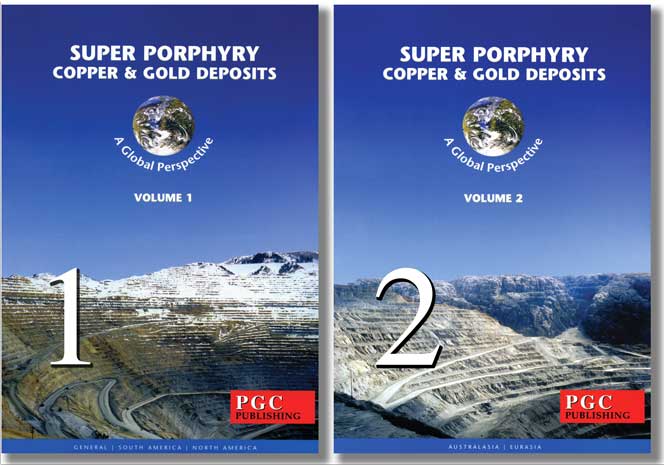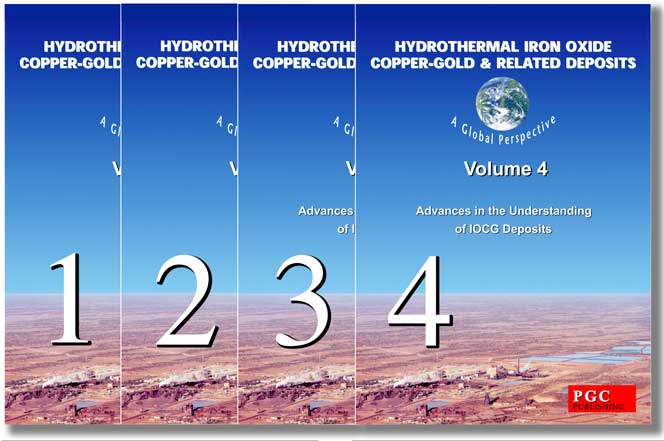|
Tem Piute, Emerson |
|
|
Nevada, USA |
| Main commodities:
W
|
|
 |
|
 |
 |
Super Porphyry Cu and Au


|
IOCG Deposits - 70 papers

|
All papers now Open Access.
Available as Full Text for direct download or on request. |
|
 |
The Emerson mine is located at Tem Piute, 165 km north to NNW of Las Vegas, 40 km NW of Crystal Springs in western Nevada (#Location: 37° 38' 32"N, 115° 37' 51"W).
The production and reserve figures quoted during a mine visit in 1978 were:
0.9 Mt @ 0.46% WO3 (Production, to 1975, Mine visit, 1978),
8 Mt @ 0.4% WO3 (Reserve, 1978, Mine visit, 1978).
The mine was operated by Union Carbide when visited in 1978. Mineralisation was discovered in 1916, with the first mining in 1937. The mine was shut down in 1982 and "moth-balled" in 1985.
The host to mineralisation at Tem Piute lies just below the contact between a sequence of Devonian dolomites, limestones and minor quartzites and shale; and lower Carboniferous interbedded limestone, shale and quartz sandstone. The Carboniferous is intruded in the mine area by two Cretaceous quartz-monzonite stocks, each some 1.5 km in diameter. The ore zone is developed along the contact of the southern most of these stocks. Tactites and silicified limestone lithologies are developed within both the Devonian and Carboniferous units, while platy hornfels are found within the Devonian. Four main types of tactite are recognised within the orebody, as follows:
i). Garnet tactite composed of 80% coarse grossularite-andradite, grading to almandine with minor biotite and silica, and variable minor pyrite, pyrrhotite and trace sphalerite;
ii). Sulphide tactite which carries in excess of 50% sulphide, mainly coarse pyrite and pyrrhotite; this is a minor component of the orebody, accounting for <10%; it grades vertically and laterally into sulphide and garnet tactite;
iii). Pyroxene-garnet tactite, composed of a fine, even grained, homogeneous mixture of pyroxene, mainly diopside, and garnet with the same composition as described above;
iv). Epidote-chlorite tactite, a classification used to cover a variety of lithologies containing two or more of, calcite, chlorite, epidote, fluorite and pyroxene.
The 'epidote-chlorite' tactite, irrespective of its composition, always carries the highest grade, usually >1% WO3. It is found within both the Carboniferous and Devonian, but is always the furthest removed from the intrusive contact and is generally adjacent to the tactite to un-altered limestone contact.
The sulphide and high garnet tactites are restricted to the Carboniferous rocks, while the garnet-pyroxene tactite is developed immediately adjacent to, and grade into, platy hornfels of the Devonian sequence. The sulphide tactite is developed immediately adjacent to the intrusive contact.
The orebodies occur as shoots within the tactites, rather than as continuous sheets. They vary in thickness from 0 to 30 m, averaging around 6 m. The shoots within the Carboniferous unit extend for 20 to 100 m along strike and up to 120 m down dip, while those on the Devonian rocks have strike lengths of 25 to 100 m and down dip extents of around 60 m. These shoots and pods are developed over a minimum vertical interval of 500 m and laterally for up to 1500 m.
The most recent source geological information used to prepare this decription was dated: 1978.
This description is a summary from published sources, the chief of which are listed below.
© Copyright Porter GeoConsultancy Pty Ltd. Unauthorised copying, reproduction, storage or dissemination prohibited.
Emerson
|
|
|
|
Porter GeoConsultancy Pty Ltd (PorterGeo) provides access to this database at no charge. It is largely based on scientific papers and reports in the public domain, and was current when the sources consulted were published. While PorterGeo endeavour to ensure the information was accurate at the time of compilation and subsequent updating, PorterGeo, its employees and servants: i). do not warrant, or make any representation regarding the use, or results of the use of the information contained herein as to its correctness, accuracy, currency, or otherwise; and ii). expressly disclaim all liability or responsibility to any person using the information or conclusions contained herein.
|
Top | Search Again | PGC Home | Terms & Conditions
|
|